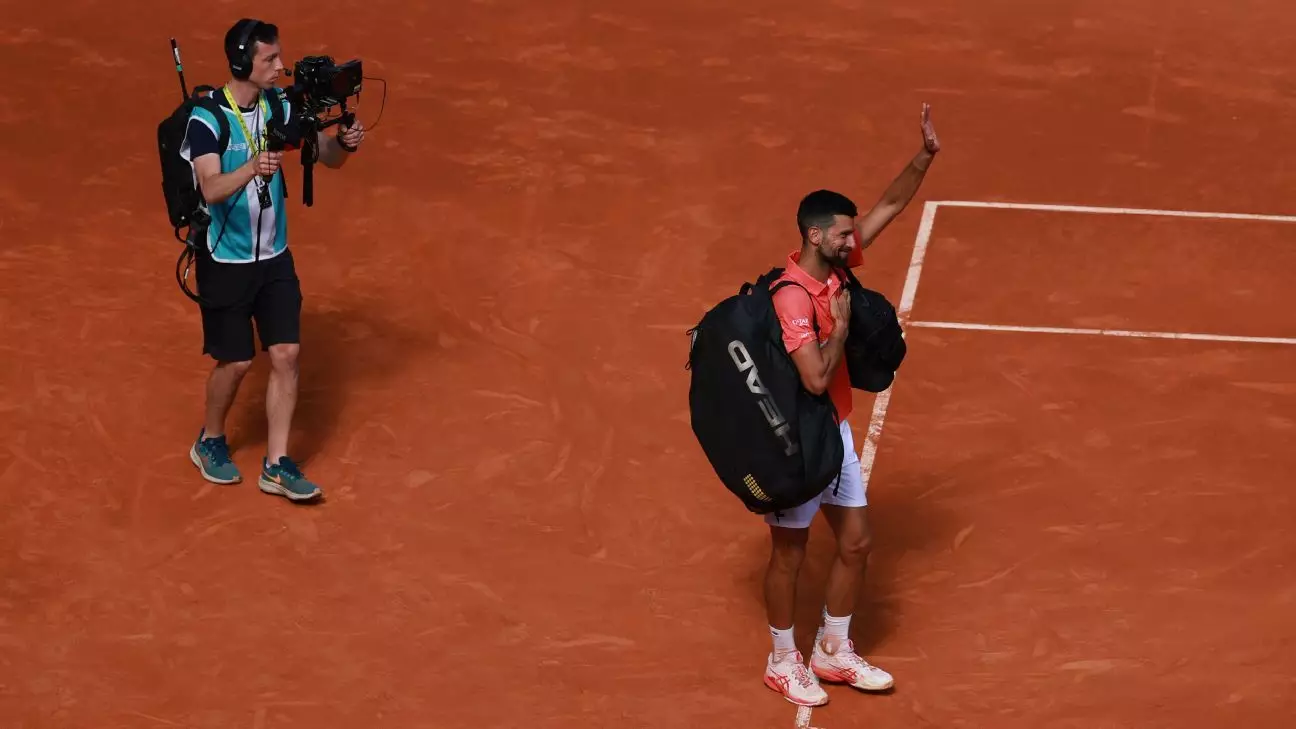In a remarkable spectacle that highlighted both the tenacity and vulnerability of champions, Novak Djokovic faced an unexpected setback at the Madrid Open. Known for his invincible aura, Djokovic stretched his limits against Matteo Arnaldi but ultimately succumbed in straight sets. The 37-year-old tennis legend, who has claimed 24 major titles, found himself unable to turn the tide in a match that starkly reflected the frailties of the human experience, even for the best in the world. The world watched as he cupped his ear mid-match, seeking support from the crowd after an impressive retrieval of a seemingly unreachable ball. However, in the end, it was not enough to reignite his competitive flame against an inspired Arnaldi.
As he walked off the court, Djokovic’s defeat signaled more than just an uncharacteristic loss; it was a marker of a challenging transition period. This year has been less than kind to the seasoned athlete, as he has struggled to find his rhythm, losing four finals since winning his 99th title last August. With the French Open looming, questions abound about his readiness. Djokovic’s uncharacteristic 32 unforced errors—almost twice as many as Arnaldi’s 18—tell a story of a player grappling with an unsteady foundation during a vital phase of the season.
Arnaldi: The Underdog’s Triumph
The defeat was not merely a testament to Djokovic’s struggles; it also cast a brilliant spotlight on Matteo Arnaldi. The Italian, ranked just 44th, entered the match recognizing the monumental challenge ahead but emerged victorious, undoubtedly one of the biggest wins of his young career. For Arnaldi, playing against his idol became an empowering experience rather than a source of intimidation. His victory exemplifies the notion that in sports, and indeed in life, the shifting dynamics of power can turn moments of doubt into moments of triumph.
Arnaldi’s exuberance was palpable as he celebrated a pivotal point with his arms raised high, signaling to the crowd that he was ready to claim the day. His poise under pressure—especially when he saved multiple break points from Djokovic—showcases not only skill but crucial mental fortitude. In acknowledging Djokovic’s waning performance, Arnaldi’s strategy was clear: to seize the moment and deliver his best tennis, a thrilling reminder that even the most seasoned players face their vulnerabilities.
Transitioning Ages in Tennis
At 37, Djokovic’s current predicament invites broader reflections on transition and adaptation within sports. The grueling nature of maintaining peak performance levels in the face of age is a challenge faced not just by Djokovic but by athletes across various disciplines. The proactive environment of professional tennis, with its physical demands and intense competition, is unrelenting. Many legends grapple with this reality, paving the way for younger players like Arnaldi to assert themselves and reshape the hierarchy of the sport.
Moreover, the pressure of achieving milestones—such as pursuing a 100th title—can weigh heavily on an athlete’s psyche. Djokovic’s historic quest underscores the burden of expectations, as well as the external pressures that can complicate one’s game. In this light, failures, though painful, may become catalysts for growth, pushing athletes to evolve and adapt to an ever-changing landscape.
Rising Stars: A Fresh Narrative
Amidst these narratives of loss and resilience, the emergence of younger players cannot be overlooked. The Madrid Open also showcased the outstanding talents of players like 17-year-old Mirra Andreeva, who reached the last 16 with her own brand of determination and skill. Her journey mirrors Arnaldi’s, bearing the positive energy and vibrancy of youth amidst the shadows of established legends.
Andreeva’s progress serves as a reminder that every generation brings a set of aspirations and dreams, often challenging the status quo. As new stars shine in an ever-evolving tennis landscape, they not only create an exciting future for the sport but also inspire current champions to rediscover the fire that initially propelled them to greatness.
As Djokovic navigates through this transitional phase, the celebration of rising talent offers a dual narrative: one of nostalgic admiration for the champions of yesterday and a hopeful view toward the potential of tomorrow. The balance between legacy and legacy-building defines the very essence of sports—where triumph and defeat coexist, each telling its unique story.


Napsat komentář